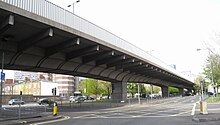Hammersmith Flyover
| Hammersmith flyover | |
|---|---|
 |
|
| Carries | |
| Maintained by | TfL |
| Characteristics | |
| Total length | 622 m |
| Width | 18.6 m |
| Longest span | 42.7 m |
| No. of spans | 16 |
| History | |
| Architect | Hubert Bennett |
| Designer | G. Maunsell & Partners |
| Constructed by | Marples, Ridgway and Partners |
| Construction begin | January 1960 |
| Construction end | 16 November 1961 |
| Construction cost | £1.2–1.3 million |
| Opened | 16 November 1961 |
| Statistics | |
| Daily traffic | 85,549 (2011) |
The Hammersmith flyover is an elevated roadway in west London which carries the A4 arterial road over and to one side of the central Hammersmith gyratory system, and it links together the Cromwell Road extension (Talgarth Road) with the start of the Great West Road. It is one of the first examples of an elevated road using reinforced concrete.
An elevated road employing reinforced concrete balanced cantilever beam supports with a single central column. The deck spine and wings are of hollow prestressed concrete design, with each span being tensioned by longitudinal tendons (four clusters, each of sixteen 29mm steel cables). The flyover was designed by G. Maunsell & Partners, Consulting Engineers, led by Peter Wroth and is 622 metres long. When built the flyover included heating cables to "eliminate ice formation". The system was initially successful, though a £4800 bill for the 1962–63 winter "so shocked Hammersmith Borough Council that, as a protest, it cut off the electricity". London County Council paid the bill after this.
The heating system became defective at some point a "long time" before 2000.
Completed in 1961, it was one of the first examples of its design. Marples, Ridgway and Partners, a Westminster-based civil engineering contractor, built the flyover at a cost of £1.3 million. The then Conservative Transport Minister Ernest Marples had been a Marples, Ridgway shareholder. To avoid a conflict of interest Marples undertook to sell his controlling shareholder interest in the company as soon as he became Minister of Transport in October 1959, although there was a purchaser's requirement that he buy back the shares after he ceased to hold office, at the price paid, should the purchaser so require.
A large part of the churchyard of St Paul's Church, the parish church of Hammersmith, had to be cleared to allow the building of the flyover, and much of the churchyard wall and many of the graves were lost.
...
Wikipedia
